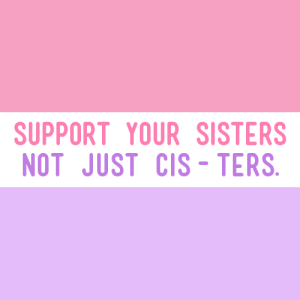
A person with a towel around their neck and an exercise ball behind them stares at their phone with headphones in their ears.
I’ve had a very strained relationship with fitness.
I learned about exercise as I imagine most girls did: in relation to weight loss. Fitness and exercise were never explained to me as ways to reward my body. I never learned that exercise could be fun. Because I was fat as a child, I instead learned from the adults around me that exercise was primarily a punishment for eating – a punishment I deserved because I was fat.
To put it simply, the fitness world is full of fatphobia. It’s how the capitalist structure of the weight loss industry has managed to operate for so long. You don’t have to look all that hard to find fitness “experts” insisting that “now is the time to lose that belly fat for good.”
Because of this landscape, it’s sometimes difficult to discuss being active and working out without engaging in fatphobic rhetoric.
Fatphobia refers to the systemic oppression of fat individuals. Fat people are constantly told that our bodies are a social ill that must be eradicated. It’s very difficult for fat people, especially feminine-presenting fat folks, to get through a day without being reminded that our bodies are (supposedly) diseased and must be cured through weight loss.
Because we have all internalized fatphobia, this reflex to encourage fat people to lose weight isn’t entirely our faults. There’s been a long history in our culture of equating fatness to ill health. And these ideals take an active (pun intended) effort to unlearn.
That being said, there are certain ways that people who wish to discuss their fitness regimen can minimize the fatphobic rhetoric that’s been normalized within the fitness community.
Here are six tips for respecting fat people, even if you love talking about exercising and staying active.
1. Get Consent Before Beginning a Conversation About Weight, Fitness, or Food
I was at an outlet clothing store one day flipping through the sales rack aimlessly when a woman began a conversation with me.
She had picked up a blouse and checked the tag before saying to me, “Ugh, they keep putting size sixes on size 14 hangers. If I could squeeze into those, about a hundred of my problems would disappear!”
Now, while I’m sure she said it out of frustration and self-deprecation, I felt catapulted into a conversation I was tremendously uncomfortable with. Not only was I just beginning my eating disorder recovery at the time, but I was also much bigger than this woman.
I was in the process of trying to fight off that eating disorder voice that pushed that exact same narrative: that weight loss would solve all of my problems. This woman served as validation for that destructive narrative.
Unfortunately, these everyday conversations are more common than not. There is a diet culture within our society that suggests it’s perfectly appropriate to engage in weight, fitness, or food talk in casual conversations.
Part of this diet culture suggests that everyone is trying to achieve thinness – and that that’s something we have in common with one another. Because of this perceived commonality, most people don’t ask if it’s okay to discuss this potentially sensitive subject before immediately jumping into a conversation about their latest gym session.
It may feel unnatural to ask for consent in the middle of a casual conversation. But you can do this in a few ways.
Firstly, consent is not always verbal. If you make a comment about going to the gym regularly and the person you’re talking to makes a face or shifts their body away from you as if they want to get out of there, they probably don’t want to discuss this. Change the subject.
Secondly, there’s a way to ask if someone wants to discuss something without making it feel weird or too stiff. If the topic seems to arise effortlessly, you can throw in a little disclaimer after your first fitness-related statement, such as: “Are you okay if I go into more detail? I know some people get really annoyed or bored when people discuss their workouts.”
Additionally, you could make sure you pause long enough to allow for the other person in the conversation to change the subject. If the other members of the conversation say that they’re not comfortable, move on to a different topic. Don’t try to pressure them into it.
Fat people usually don’t feel safe around anyone who subject us to potentially triggering conversations.
And of course, if someone else has started the conversation, you can decide if you’re comfortable or uncomfortable continuing it. If they get defensive about your not wanting to talk about weight or fitness, then you probably don’t want to talk to them anyway – because they don’t respect your boundaries.
2. Be Careful of Equating Weight Loss to Health
Many people who exercise regularly do so to lose or otherwise control their weight. The problem, however, is in the assumption that this is a sign of good health.
People can be healthy at every size. Suggesting that weight loss is crucial for every fat person in order for them to be “healthy” – which has multiple meanings itself (see number 7) – is not only factually incorrect, but a form of violence.
Frequently, the focus of doctors on weight loss leads to harm of fat people, who can achieve the health markers (such as a certain blood pressure, cholesterol, or resting heart rate) that doctors typically use as an indicator of health.
Linda Bacon, the author of Health at Every Size, suggests from her research that when focused on a holistic approach to health – such as exercising and eating nutritious food in a balanced diet – rather than weight loss through caloric deficit, people categorized as “overweight” or “obese” have much higher rates of long-term success in maintaining such health markers. They also typically report feeling much more satisfied overall with their bodies.
Additionally, studies have shown that the majority of fat people, specifically fat women, don’t engage in weight loss for health reasons. Scholar Natalie Boero outlined in her book Killer Fat that the majority of women in her sample of interviews were motivated to lose weight to alleviate the stigma of fatness rather than to achieve optimal health.
One reason she draws this conclusion is because of the extreme measures a significant number of women take to lose weight, from starving themselves on dangerous diets to undergoing various types of weight loss surgeries that have severe and lifelong side effects.
By equating weight loss with health, you assist in upholding social stigma that assumes the fat body is unhealthy and unproductive. Therefore, it’s a good rule not to bring up your weight loss to a fat person unless they specifically inquire about it – because it could feel triggering.
Avoiding this stigmatization of the fat body goes a long way toward eliminating concern trolling, which is one of the most prominent reasons for fat-shaming.
3. Don’t Play into the ‘Good Fatty’ Trope
The good fatty trope is the idea that it’s morally acceptable for a fat person to be fat, so long as they try their best not to be fat.
How many times have you heard someone say something to the effect of the following: “She works out every day and loves to eat salads, but she can’t lose weight. She’s just naturally bigger.” The unspoken end of that statement is “it’s not her fault she’s fat.”
The good fatty narrative plays into the idea that as long as a fat person is trying their best to eradicate their fatness, they should be treated with respect. But the fact of the matter is that all people should be treated with respect, fat or otherwise.
Fat people exist. And it doesn’t matter what they do or don’t do about their fatness. If the only fat people you’ll accept are those who try not to be fat, then you’re not being a respectful person.
You may be unintentionally playing into this trope with certain comments you make about your own body or that of others. Some examples of comments that fall under the good fatty trope are:
- “It’s always so encouraging to see overweight people at the gym.”
- “I never cheat, and I work out every day, but I’m still not losing weight.”
- “I’m going to have to go for a run after this meal!”
All of these comments suggest that we must always be thinking about how to control and change our bodies. These comments claim that maintaining a socially acceptable weight is a key part of our personal morality.
When you suggest to a fat person that they should at least try to be thin, you’re not only breaking rule two, but you’re also telling this fat person in your life that they are simply not good enough.
4. Think Twice Before Posting Before and After Photos on Social Media
Before and after photos are a form of fat-shaming. They imply that the thinner body in the after photo is better than the fat body in the before photo.
I can hear you now: But, Charlotte, that’s a real source of motivation for me!
If this is your first reaction, then you might want to take a step back and think about your personal motivation. Because this reaction shows that you’re harboring some internalized fatphobia.
Whether consciously or not, you believe that a thinner body is somehow more desirable than a fatter body. Otherwise, why would before and after pictures that show shrinking bodies motivate your actions?
This also suggests to me that you may be losing weight to achieve thin privilege, rather than actually being all that concerned about your fitness or health levels. It could also mean that you think that you’re able to tell if someone is making progress with their health just by looking at how thin their body is (please re-read number 2!).
But if you’re really unwilling to let go of your before/after photo, just don’t put them online where your fat friends may see them without prior warning. Keep them private – and only show them to people who expressly agree to look at them.
5. Emphasize Why Wellness Is Important to You (Aside From Your Weight)
As I mentioned in the beginning of this article, a lot of us have been taught to equate exercise with controlling our bodies.
From as early as eleven years old, I knew that people went to the gym to run for hours on a stationary machine so that they wouldn’t gain weight. I quickly learned the social value of thinness, but I never learned about the physical and emotional benefits of exercise.
The first thing you must think about in order to undertake step four is: Why do you exercise? Think about at least three reasons why you work out other than “so I don’t get fat.” When you have those three reasons, talk about them!
Instead of resorting to discussing the weight you’re attempting to lose, talk about how you feel during your workout regimen. Talk about how you beat a personal record at the gym and you can’t wait to beat the next one. Discuss the stamina you’re building or how the pain you used to feel in your shoulder from an injury you got in high school is starting to subside because you’re strengthening the surrounding muscles.
There are plenty of ways to discuss your progress and goals without mentioning your weight or body size. And I challenge you to keep coming up with more than your initial three!
Not only will this make fat people feel safer around you, but it can also help strengthen your personal relationship with exercise.
6. Recognize That People Who Choose Not to Prioritize Wellness in This Way Aren’t Wrong
Sometimes, people who work out religiously don’t realize that those who choose not to do so might have a really good reason (not to mention, it’s ableist as all hell).
Saying things along the lines of “It’s everyone’s responsibility to exercise and take care of themselves” dismisses those who are taking care of themselves by not exercising or counting calories.
This idea piggy backs off of the “good fatty” trope. People don’t have to do anything to achieve worthiness. I really shouldn’t have to give you a reason why that’s true, but I’m going to give you a few anyway because you’re here to learn.
Many fat people have learned – often since childhood – that the supposed answer to every one of our problems is to lose weight. We hear it from our doctors, our family, our friends, the media and – eventually – ourselves.
It may be paramount to a fat person’s mental health to avoid exercise altogether because it can remind us of a time in our lives when we felt helpless or terrorized by our weight. In some of us, exercise may even trigger eating disordered thoughts or behaviors.
There may be an array of rational reasons why a fat person chooses not to exercise that have nothing to do with our motivation or self-discipline.
Additionally, there is a stigmatizing aspect to fat people exercising. Some fat people, specifically fat women, are afraid to exercise because of fear we would be judged when doing so.
Sport England conducted a study on women and exercise and found that one of women’s primary barriers to exercising more is their fear of judgment. Their research resulted in a wonderful campaign called “This Girl Can,” which is meant to encourage women and girls of all ages and sizes to get active despite insecurities.
https://www.youtube.com/watch?v=toH4GcPQXpc
It’s patronizing for thin people to assume that fat people can’t take care of themselves.
Breaking free from the tyranny of diet culture and exercise is often an important step for a fat person’s self-acceptance and healing.
***
If these tips seem overwhelming to you, you may want to start working on eradicating your own internalized fatphobia before you attempt to engage in these sorts of conversations, especially around fat people.
When thin people start talking about how tortured they are by calories, weight loss, or the pull to work out, I honestly feel a little sorry for them. I’ve been subjected to body terrorism my whole life, so it’s easy for me to spot other people experiencing it.
Learning to engage in exercise while rejecting fatphobia can be a liberating experience for you as well as the fat people in your life. Considering what fat people go through on a daily basis, we definitely deserve a break from a toxic diet culture.
[do_widget id=’text-101′]
Charlotte Morabito is a recent college graduate with bachelors degrees in Journalism and Media Studies and Women’s and Gender Studies. She is trying to figure out her next step post-grad by writing through uncertainty. You can find her latest musings at her website and her tweets at @CharlotteShouts.
Search our 3000+ articles!
Read our articles about:
Our online racial justice training
Used by hundreds of universities, non-profits, and businesses.
Click to learn more




















